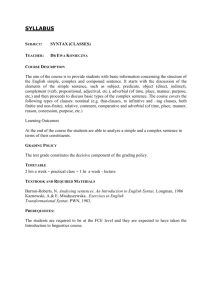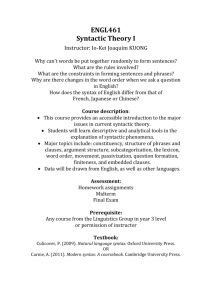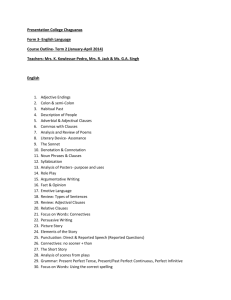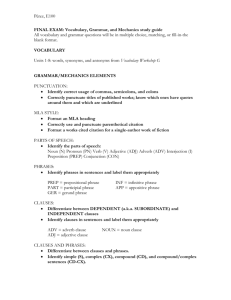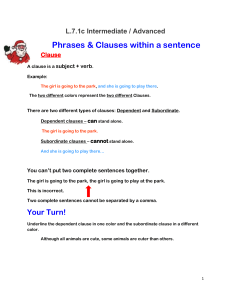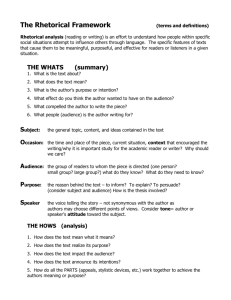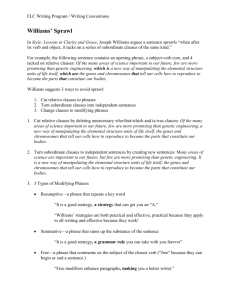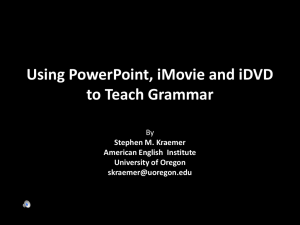Syntax: Sentence Structure
advertisement
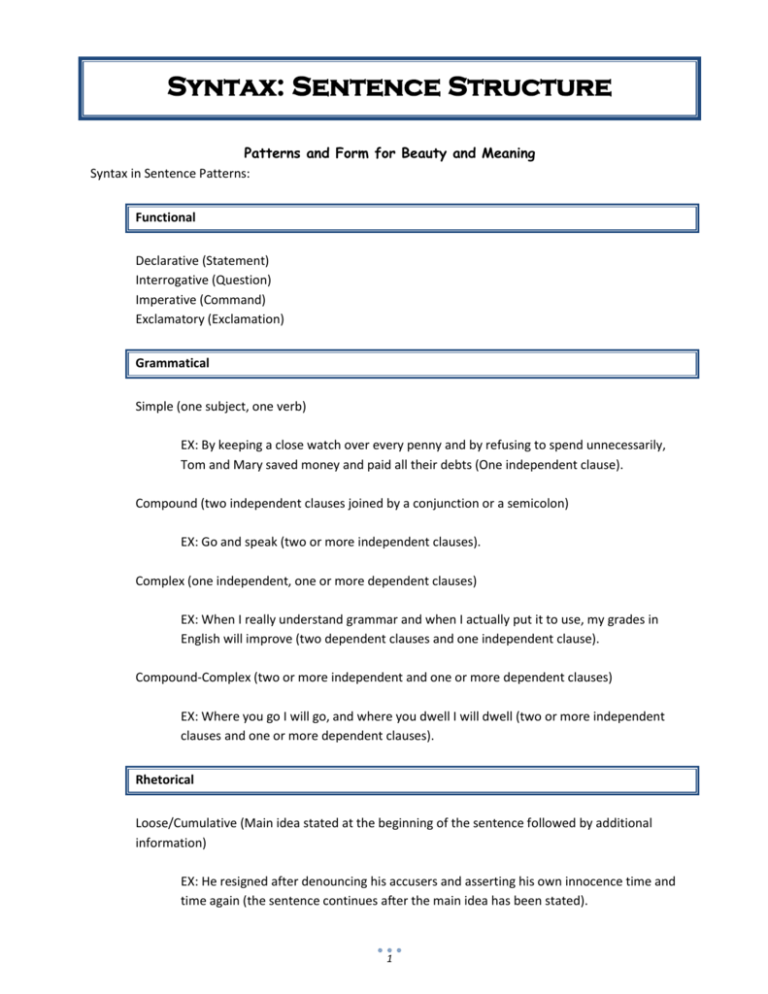
Syntax: Sentence Structure Patterns and Form for Beauty and Meaning Syntax in Sentence Patterns: Functional Declarative (Statement) Interrogative (Question) Imperative (Command) Exclamatory (Exclamation) Grammatical Simple (one subject, one verb) EX: By keeping a close watch over every penny and by refusing to spend unnecessarily, Tom and Mary saved money and paid all their debts (One independent clause). Compound (two independent clauses joined by a conjunction or a semicolon) EX: Go and speak (two or more independent clauses). Complex (one independent, one or more dependent clauses) EX: When I really understand grammar and when I actually put it to use, my grades in English will improve (two dependent clauses and one independent clause). Compound-Complex (two or more independent and one or more dependent clauses) EX: Where you go I will go, and where you dwell I will dwell (two or more independent clauses and one or more dependent clauses). Rhetorical Loose/Cumulative (Main idea stated at the beginning of the sentence followed by additional information) EX: He resigned after denouncing his accusers and asserting his own innocence time and time again (the sentence continues after the main idea has been stated). 1 Periodic (Main idea withheld until the end of the sentence) EX: After denouncing his accusers and asserting his own innocence time and time again, the State Department Official resigned (main idea is suspended until the end). Balanced (the phrases or clauses balance each other in likeness or structure, meaning, or length) EX: To err is human, to forgive divine. But, in a large sense, we cannot dedicate, we cannot consecrate, we cannot hallow, this ground. Together we planned the house, together we built it, and together we watched it go up in smoke. Basic Rhetorical Techniques in Syntax Antithesis (A contrast used for emphasis) EX: India is a poetic nation, yet it demands new electrical plants. It is a mystical nation, yet it wants new roads. It is traditionally a peaceful nation, yet it could, if misled, inflame Asia. EX: A man dies on the shore; his body remains with his friends, and the “mourners go about the streets”; but when a man falls overboard at sea and is lost, there is a suddenness in the event which gives it an air of awful mystery. Juxtaposition (Unassociated ideas, words, or phrases are placed next to one another, creating an effect of surprise) EX: The apparition of these faces in the crowd: /Petals on a wet, black bough. Parallelism (Structural similarity between sentences or parts of a sentence) EX: He was walking, running, and jumping for joy. ‘ Repetition (Words, sounds, and ideas used more than once for enhancing rhythm and creating emphasis) EX: “. . . government of the people, by the people, for the people, shall not perish from the earth.” Rhetorical Questions (A question which expects no answer—used to draw attention to a point, stronger than a direct statement) EX: “Shall the blessed sun of heaven prove a micher and eat blackberries? A question not to be ask’d. Shall the son of England prove a thief and take purses? A question to be ask’d. –Henry IV 2 Advanced Rhetorical Techniques in Syntax Anaphora [un NAF or uh]: the repetition of the same word or group of words at the beginning of successive clauses EX: “We shall fight on the beaches, we shall fight on the landing-grounds, we shall fight in the fields and the streets, we shall fight in the hills.” (Winston Churchill) Asyndeton [us SIN duh tun]: the deliberate omission of conjunctions in a series of related clauses EX: “I came, I saw, I conquered.” (Julius Caesar) Chiamus [ky AZ mus]/Antimetabole [an ti me TA boh lee]: a sentence strategy in which the arrangement of ideas in the second clause is a reversal of the first EX: “Ask not what your country can do for you; ask what you can do for your country.” (John F. Kennedy) Epistrophe [uh PIS tro fee]: the same word is repeated at the end of successive phrases, clauses, or sentences EX: “I believe we should fight for justice. You believe we should fight for justice. How can we not, then, fight for justice?” (Martin Luther King) Polysyndeton [pah lee SIN duh tun]: the deliberate use of many conjunctions for special emphasis EX: “The meal was huge—my mother fixed okra and green beans and ham and apple pie and green pickled tomatoes and ambrosia salad and all manner of fine country food— but no matter how I tried, I could not consume it to her satisfaction.” (Zora Neal Hurston) Zeugma [ZOOG ma]: the use of a verb that has two different meanings with objects that complement both meanings EX: “He stole both her car and her heart that fateful night.” Sentence Patterns Basic (S-V-C) EX: John hit the ball. 3 Inversion (V-S, used for emphasis) EX: He could never forgive this (S-V-C). This he could never forgive (C-S-V). At the last minute Sally rushed in (S-V). At the last minute in rushed Sally (V-S). They laid him down slowly and sadly. Slowly and sadly they laid him down. To improve your writing you can go through an essay and note the ratio of inverted sentences to normal sentences. Be sure to track the different kinds of inversion. You cn also practice writing clauses in parallel or mirrored patterns of syntax. See the example below. S Joe V slipped V _______ C C in; in S ________ V slipped S Joe C _________ C __________ V ______ S __________ Sentence Openers EX: He met a most attractive girl at the party. At the party he met a most attractive girl. He met, at the party, a most attractive girl. Consequently, he is no longer interested in Marie. He is, consequently, no longer interested in Marie. He is no longer interested, consequently, in Marie. a. Adverbial (answers questions such as: Where? Why? How? When? To what degree? Also, conjunctive adverbs such as: nevertheless, therefore, then, see list of subordinating conjunctions) *The following may be categorized under “adverbial” types of openers Conjunctive phrase (on the other hand, as a consequence, indeed) Example: On the other hand, there are many negative consequences…. Prepositional phrase (after, in the morning) Example: After missing the bus, I decided to walk to class. b. Verbal (participle, gerund, infinitive) 4 Examples: Disillusioned by the lack of public support, the candidate withdrew his bid for political office. Smoking cigarettes is dangerous to your health. To show his delight at the proposal, Mr. Smith jumped off the stage. c. Adjectival (answers questions such as: Which one? What kind?) Adjective phrase Examples: Tired and exhausted, the children quietly went to bed. Vibrant, bold, and irrepressible—Zora Neale Hurston took the Harlem literary community by storm. d. Coordinating conjunction (and, but, or, nor, for, yet, so) e. Other: Expletives (“it is” “there is” “this is”) Examples: There are many reasons why people enjoy surfing. It is the reason for my project. Absolute phrase (a phrase which usually contains a noun or pronoun and a participle—it modifies the entire sentence rather than a particular word and is usually separated from the rest of the sentence with commas--) Examples: Their sense of mischief awakened, Huckleberry Finn and Tom Sawyer plotted the downfall of the villains. Its blade churning, the huge combine cut its way through the winter wheat. All things considered, it was a good day. Sentence Length Telegraphic (Shorter than five words) Medium (Approximately eight words in length) Long or Involved (thirty words or more) 5 Word Syntax or Order for Words Word order usually matters in English. That is, one of the important ways we secure meaning in English is by putting words in a certain order. Consider the following sentences. The dog chases the cat. The cat chases the dog. Blowing down the chimney, the wind chilled the girl. The wind chilled the girl blowing down the chimney. He also longs for great success abroad in the field of dramatic music. He longs for great success also abroad in the field of dramatic music. He longs for great success abroad also in the field of dramatic music. Notice how the meaning of a sentence changes when “only” wanders around a sentence. Only the new manual confused the nurse. (The old one didn’t confuse her.) The new manual only confused the nurse. (It didn’t spoil her day.) The new manual confused only the nurse. (It didn’t confuse other medical staff.) The new manual confused the only nurse. (There was only one nurse.) An exception to the importance of word order in English is the adverb; one characteristic of the adverb is that, at times, it can floats all over the sentence, taking up pretty much any place it wants to without changing the meaning of the sentence: Slowly, the red panda turned over on the branch. The red panda slowly turned over on the branch. The red panda turned slowly over on the branch. The red panda turned over slowly on the branch. The red panda turned over on the branch slowly.1 This makes the adverb very useful in poetry and anywhere else that an author is concerned about the positioning of certain words. 1 I first was taught this by Michael C. Drout in his audio book Grammar for Adults. This specific example is his. 6
